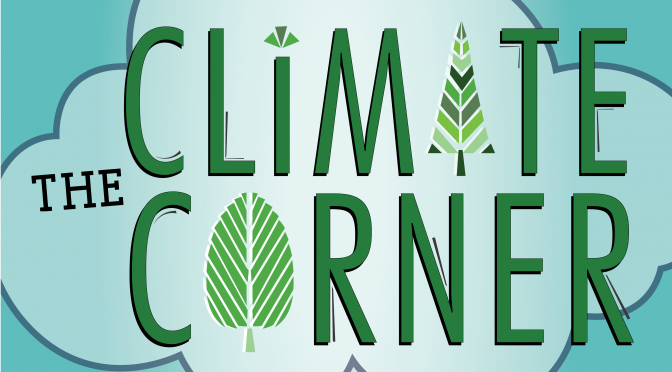
How human activity causes change
By: Cody Boteler, Senior Editor
Science is hard. It’s confusing and a lot of people who start as science majors change to a discipline that might be less demanding. I started as an environmental science major and switched to a minor, in part because the major would have been much more demanding of my time.
So, I get it. Science is hard. But the science of human-caused (anthropogenic) climate change doesn’t have to be. This week, with the help of a wonderfully illustrated graphic, I’ll explain the basics of how human activity can influence the climate.
That way, we’ll have the ground rules of climate change set before we start digging in to other topics.
Before getting into the step-by-step of it, I want to stress that this is a simplified version. This is a column, not an environmental science textbook. If you’re interested, it’s not difficult to find more detailed information about the workings of climate science.
Step A) Human activity, like the burning of fossil fuels to produce electricity or drive cars, releases carbon dioxide into the atmosphere. Carbon dioxide is a greenhouse gas – it contributes to the trapping of heat and energy in the atmosphere. Keep this in mind as we’re discussing the later steps.
Step 1) High energy, short-wave radiation is emitted from the sun. This energy, once it travels through space and reaches our planet, is what powers life on Earth.
Step 2) Some of that energy is reflected back into space. Some is reflected by the atmosphere and some is reflected by the surface.
3) The energy that isn’t reflected back into space is absorbed, either in the atmosphere or by the surface.
4) Earth re-emits the energy that it has absorbed as lower energy, long-wave radiation.
5) Greenhouse gases, like carbon dioxide or methane, trap some of that energy in the atmosphere.
If there were no greenhouse gases in the atmosphere, Earth would be too cold for life to exist. If there is less gas in the atmosphere, less energy will be trapped. Conversely, if there is more gas in the atmosphere, more energy will be trapped.
Over Earth’s geologic history, carbon dioxide levels in the atmosphere have varied. The problem now, however, is that we’re adding so much carbon dioxide to the atmosphere so quickly.
Temperature, as you may remember from science class, is a measure of energy. As more energy is trapped in the atmosphere, the more the temperature on the surface will rise.
Data from NASA indicate that carbon dioxide levels in the atmosphere are higher than they have been in 650,000 years. Global temperature has increased 1.4 degrees Fahrenheit since 1880. NASA indicates that we lose 258 billion metric tons of land ice each year – leading to a sea level rise of 3.19 mm (.125 inches) per year.
When people say the climate is changing, that’s what they mean. It doesn’t mean that winter will suddenly disappear or that summer will extend and every day will be beach weather. It means gradual changes and shifts toward a warmer climate.
We’re accelerating that change by pouring greenhouse gases into the atmosphere. If we don’t act to slow down our output and work toward adapting toward our already-changing climate, the results will be catastrophic.
But more on that next week.


I agree on your perspective that human activity has an impact on the atmosphere. Science is truth, even if you don’t believe it. However, I disagree with your opinion that science is hard. It may be more demanding that some fields but isn’t that what makes something more rewarding when you succeed? If children from an early age are encouraged to embrace the sciences and mathematics maybe it won’t seem so daunting in college. If a child’s natural curiosity about their surroundings is nurtured this trait could be sustained for a lifetime. We really need more scientists and engineers, not more lawyers or marketing people (sorry folks, it’s a fact). The US is being surpassed by many other countries in student achievements in science and engineering. It’s up to current and future generations to pick up this slack. Be a geek. It’s cool. Plus that’s where the good jobs are!